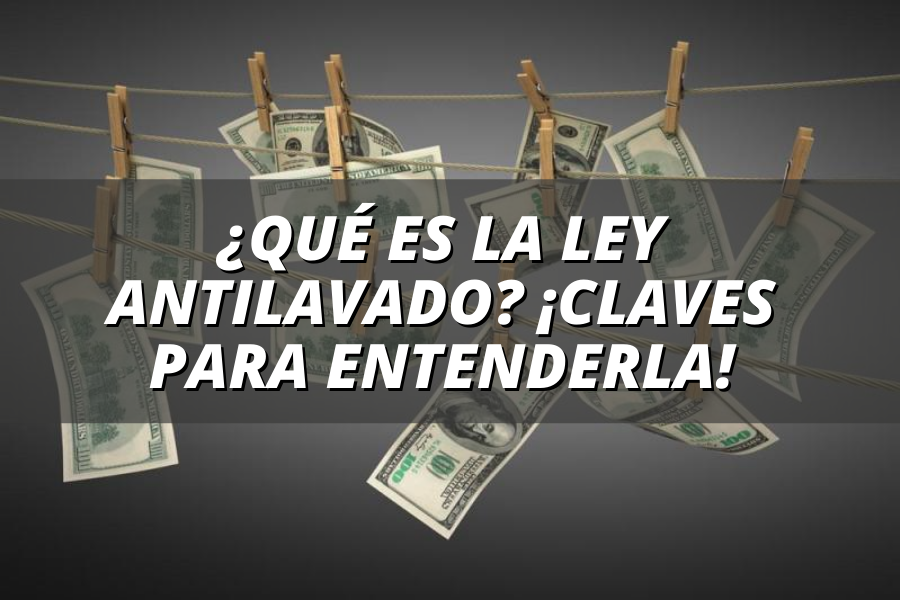Next, in this article we invite you to know each and every one of the most interesting details corresponding to the Anti-Money Laundering Law and in this way, be fully capable of knowing what is the Anti-Money Laundering Law and more.

¿What is the Anti-Money Laundering Law?
What is the Anti-Money Laundering Law?
It has been estimated that the amount of money laundering is rising to at least ten million dollars per year, so it really represents 3.6% of the Gross Domestic Product or also known as GDP within Mexico.
That is why in this article we invite you to know each and every one of the most interesting details regarding What is the Anti-Money Laundering Law? so that in this way, you are fully capable of knowing each of the most relevant aspects.
Anti-Money Laundering Law: Origin
When we refer to the famous expression "Money Laundering", we mention that its origin dates back to the United States of America in the 1920s, at the time when a group of criminals, including Al Capone, Charle "Lucky" Luiano and Meyer Lanski came up with the idea of acquiring a group of laundries for the sole purpose of working with a legal business so that they would be able to justify profits.
Such profits came from more illicit activities such as alcohol trafficking, drug sales, prostitution and other activities of the same category. The main idea was quite simple, since it only focused on mixing the various monetary gains derived from criminal activities with the other funds, apparently from the laundries.
More details
Today, according to the Ministry of Finance and Public Credit or also known as SHCP, in Mexico it is estimated that the amount of money laundering reaches at least ten million dollars at the end of each year, which It represents nothing more and nothing less than 3.6% of the country's Gross Domestic Product or GDP.
New Anti-Money Laundering Law
On July 17, 2013, the Federal Law for the Prevention and Identification of Operations such as Resources of Illicit Origin was published, being the same law that is known under the name of the Anti-Money Laundering Law and that in addition to it, Its main objective is to prevent and detect acts and operations which involve resources of illicit origin.
On the other hand, the regulations of the aforementioned Law and the General Rules that have been issued by the SHCP have been recently published and, in addition, have been in force since last November of the aforementioned year 2013.
In addition to the aforementioned, it is known that the Law imposes on individuals the obligation to inform the Financial Intelligence Unit or also known under the name of FIU, being completely dependent on the SHCP, of activities which are considered as Vulnerable.
More details of great importance
In the same way, they must identify, verify and collect the information of the subjects with whom they wish to carry out said operations with the sole purpose of identifying those responsible for the illicit acts.
On the other hand, among the first activities that must be carried out by legal entities is that of appointing a compliance officer. If they have not done so, those responsible before the authorities for non-compliance with the provisions of the Law become, among many others, the directors and administrators of the company.
As for more information, it is possible to mention that another necessary activity prior to what is known as registration with the Tax Administration Service or the SAT so that in this way, it is capable of presenting all notices, is to confirm then precisely which activities are considered vulnerable and, consequently, reportable to a competent authority.
Although the body in charge of reviewing such activities is nothing more than the FIU, before the SAT the various records and the different notices must be made known so that it is then possible to make reference to the Law, the Regulations and their General rules.
What is the Anti-Money Laundering Law: Vulnerable Activities?
In the information indicated in article 17 of the Law, it has been possible to establish as Vulnerable activities that could be carried out both in natural or legal persons and that, in addition, are not subject to identification and/or notice before the SHCP, according to the value of the operation, among others, are those that we will mention below:
First group
- First of all, it has the proper Issuance and regular or professional marketing of traveler's checks.
- Followed by it, what is offered habitually or professionally of the various mutual or guarantee operations or granting of loans or credits, with or without guarantee, when they are not carried out by Financial Entities.
- With regard to habitually or professionally facilitating the activities of manufacturing or developing real estate or intermediation in the transfer of property, where the entire process of buying/selling the goods is also included, in favor of the persons which the services are provided.
- If you wish to provide these services, you can do so on a regular or professional basis, where you include the transfer or custody of money, except in situations in which the Bank of Mexico intervenes or any institution dedicated to the deposit of securities.
#2 What is the Anti-Money Laundering Law: Second Grip?
- We continue to mention that the provision of professional services and that, in addition, they are completely independent from a client with whom there is no employment relationship, when they are prepared or carried out with their name and the other representations of a certain group of operations.
- For example, the purchase / sale of real estate, the organization and control of resources, bank accounts, securities or other objects of its clients, the planning of capital contributions or any other type of resources for the constitution, operation and administration of commercial companies. and the constitution, spin-off, merger, operation and administration of legal entities or corporate vehicles and the purchase or sale of commercial entities.
- On the other hand, certain activities that are duly linked to the practice of betting games, contests or raffles that are carried out by individuals.
- In the same way, it indicates the issuance or distribution, frequent or professional, of the different service, credit, prepaid cards and all those that are constituting the tools to store monetary value, that are not issued or marketed by Financial Entities.
Third Group
- Nearing the end, we can announce that the habitual or professional commercialization or intermediation of gold, silver and platinum, precious stones, jewels or watches.
- Regarding the frequent distribution of works of art and new or used cars, whether by air, sea or land.
- In the same way, the constitution of personal rights of use or enjoyment of real estate.
- On the other hand, certain activities carried out by brokers or public notaries.
- The provision of foreign trade services as a customs agent or proxy to promote the clearance of some merchandise on behalf of others.
Common Doubts about What is the Anti-Money Laundering Law
It is known that certain doubts have been generated about the scope and interpretation of the Law regarding what is known as the identification of activities that should be considered vulnerable. An example, the operations carried out between a group of companies, are really known as “Intercompany” (working as centralized treasury and loan operations, provision of outsourcing services, finance and legal).
It will then be possible to fit in the definition of vulnerable activities, this class of activities if it is known as the origin of the resources, which derive from the commercial operations corresponding to the group itself, however, there is no doubt about whether they are reportable. before the SHCP.
If the information shared in this article was of great help to you, we invite you to take a look at this other one about Container Packing and Packaging in Foreign Trade.
